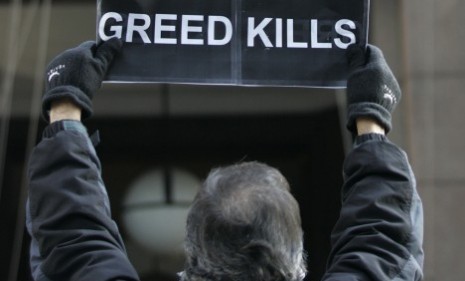The case against Goldman: Falling apart?
New testimony could derail the SEC's case against Goldman Sachs, according to some commentators

A free daily email with the biggest news stories of the day – and the best features from TheWeek.com
You are now subscribed
Your newsletter sign-up was successful
The Securities and Exchange Commission has charged Goldman Sachs with fraud for not disclosing key information to investors in a $1 billion mortgage derivative deal. The government says that the bank put the interests of hedge fund Paulson & Co.—a client that wanted the portfolio to go down in value—ahead of the interests of the investors who purchased the the products, by not disclosing Paulson & Co.'s position. But in newly revealed testimony to the SEC, a former executive of Paulson & Co., Paolo Pelligrini, claims he told a lead investor in the portfolio that his company planned to bet against (or "short") the products. Some observers say the testimony could doom the SEC's case. What's the prognosis for Goldman? (Watch a Bloomberg report about the SEC's charges.)
This is bad news for the SEC: Pellegrini's testimony is "incredibly devastating," says Joe Weisenthal in Business Insider. His statement "directly refutes" the SEC's claims that the investors "had no idea" Paulson planned to short the mortgage packages. This is "massively exculpatory" for Goldman.
"The Paolo Pellegrini testimony is devastating to the SEC"
The Week
Escape your echo chamber. Get the facts behind the news, plus analysis from multiple perspectives.

Sign up for The Week's Free Newsletters
From our morning news briefing to a weekly Good News Newsletter, get the best of The Week delivered directly to your inbox.
From our morning news briefing to a weekly Good News Newsletter, get the best of The Week delivered directly to your inbox.
The SEC could still prevail: The SEC will still "get what it wants," says Charlie Gasparino in the Daily Beast — specifically, "a settlement from Goldman." No judge or jury is going side with Wall Street's most hated firm and functionally "declare that the status quo of secret relationships is a good thing."
The government may still have cards up its sleeve: Without knowing the details, it's hard to judge the damage the testimony could do to the SEC's case, says Felix Salmon in Seeking Alpha. The SEC still has a lot of information in reserve—and prosecutors seem to have "confidence" that "Pellegrini’s testimony doesn’t really end up being all that powerful." That, or the SEC is just "dragging this whole thing out" to keep "the pressure on Goldman."
"Did ACA know Paulson was going to short?"
A free daily email with the biggest news stories of the day – and the best features from TheWeek.com
-
 Properties of the week: pretty thatched cottages
Properties of the week: pretty thatched cottagesThe Week Recommends Featuring homes in West Sussex, Dorset and Suffolk
-
 The week’s best photos
The week’s best photosIn Pictures An explosive meal, a carnival of joy, and more
-
 The ‘ravenous’ demand for Cornish minerals
The ‘ravenous’ demand for Cornish mineralsUnder the Radar Growing need for critical minerals to power tech has intensified ‘appetite’ for lithium, which could be a ‘huge boon’ for local economy